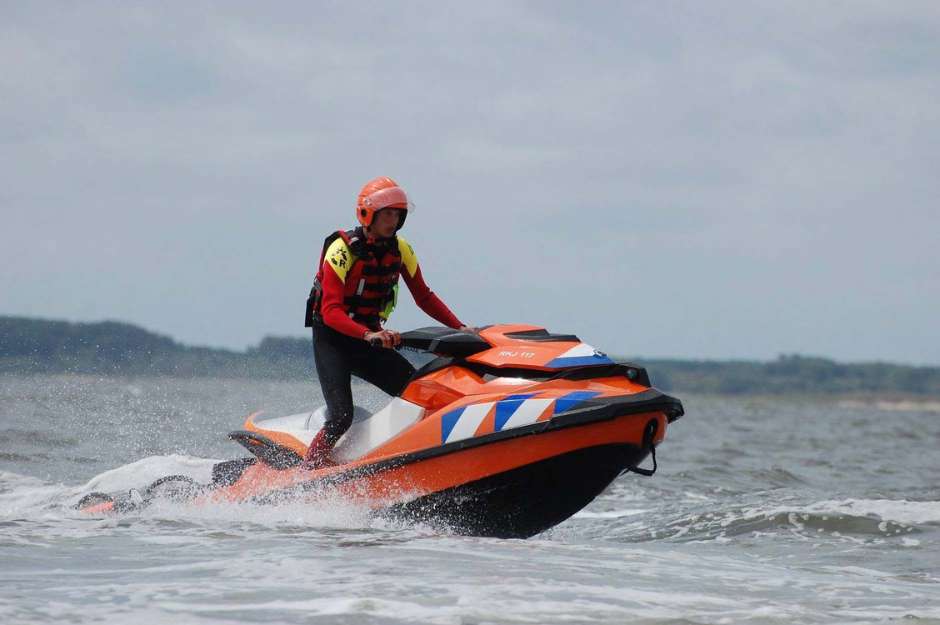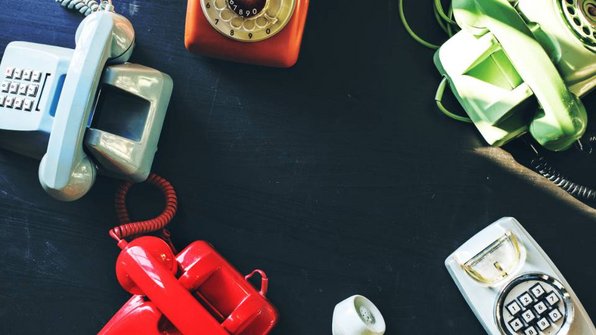Spotlight: Rockanje Rescue Brigade - A look behind the scenes

In the context of special companies and a 'look behind the scenes', this month's Spotlight is: The Rescue Brigade of Rockanje! Active on a beach loved by the Dutch near Hellevoetsluis and the Maasvlakte.
The Rescue Brigade of Rockanje is an association of volunteers that keeps the beach in Rockanje (municipality of Westvoorne, below Rotterdam) safe all year round. The busiest months are of course the summer months, but they also do not stand still in cold months such as January and February.
Although we always come across the Rescue Brigade posts while looking for a place to lay out the towel, few Dutch people know how it works at the Rescue Brigade.
Reason enough to put this customer in the Spotlight: a rescue team that uses our telephone service as a first aid line and relies on our stable connection. We are proud of it! That is precisely why we were also very curious about how things work behind the scenes at the rescue brigade.
We've asked them all the questions you've always wanted to ask our lifesavers. So read on soon!
How long has the Rockanje Rescue Brigade been in existence?
Last month, on May 23, we celebrated our 60th anniversary with a modest party. The rescue brigade was established in 1961 and there was only a shack. We now have a professional turn-out location where all our vehicles and vessels are located and from where our lifeguards operate.
Why did you join the rescue brigade?
Many of my friends were members of the rescue squad and I was actually often at the beach myself. In addition, I also find providing help interesting, even as a teenager.
The rescue brigade is a friendly group of friends for me, but with a serious goal. I've been a member for 9 years now and I always enjoy going there on my Saturday off.
What exactly is the task of the resue brigade?
Our main task is the prevention of accidents and the provision of first aid. We walk on the beach, talk to people about what they can and cannot do and hang flags with warnings.
In addition, we also patrol with our vehicles and vessels when it's busy and we turn out in case of emergencies.
Are you all doing this voluntarily?
Yes, the Rescue Brigade is voluntary. We do receive a volunteer allowance for our work, but this is not in proportion to a normal salary. Certainly not considering the number of hours that some of us work.
But we see it mainly as a way to relax, not so much as work. It's just fun to be busy on the beach, sit on the post and enjoy the beach or clear your head on the boat.
There is always something going on: strange things always happen. And chatting with colleagues of course, especially because it is really just one big group of friends!
What kind of people have joined the rescue brigade?
We have a very diverse group of lifeguards. All age groups are represented among the 60 lifeguards. We have students, schoolchildren and people who also have full-time jobs in addition to the rescue squad. Some of our members have even been with the rescue brigade for about 30 or 40 years!
What do you have to do to become a lifeguard?
You don't become a lifeguard overnight. You must have completed a course of several months. Some years we have a week of training. You start in May and join the entire season. Then we teach them all the ins and outs of our work for 1 week.
We close it with an exam, which is administered by Rescue Brigade Netherlands. This is the organization to which all rescue brigades in the Netherlands are affiliated. They arrange the training, exams and determine the criteria that rescue teams must meet.
Now this year we have been teaching on a Sunday throughout the beach season instead of in a week. The students then walk with an experienced lifeguard on Sunday, who teaches them all things. They start in May and we take the exam in August or September.
The exam consists of a theoretical part and a practical part. They have to perform a rescue, pass the first aid course and a test to see if they can swim fast and far enough, which is of course also an important part.
So you must be motivated to achieve this!
Are you only concerned with beachgoers, or also with boats that are in danger?
There is actually the KNRM for all vessels that are endangered. We are more equipped for beach work and for the holidaymakers there, including water sports enthusiasts. We do this up to 1 kilometer off the coast of Rockanje.
Everything beyond that (that is from 1 kilometer from the coast of Rockanje to the coast in England) is the responsibility of the KNRM. Fortunately for the beachgoers, we don't use a yardstick: even if they are in danger outside the kilometre, we can still take action.
How often are you at the beach?
We are there every weekend from May to September. During the high season, in July and August, a team with a minimum of 5 people is present 7 days a week. We will be there from 09:30 to 17:30. If the weather is really nice, we always stay longer, because the beach is busy longer. Fortunately, on nice days, more members always come to help on the beach.
If people are in danger, we turn out with our emergency team. This is a team of 25 people who all have a pager. They are on standby 24/7. Once called, they are on the beach within 5 minutes and on the water within 10 minutes.
To reach the emergency team, they call our emergency number or 112. The police will then notify us.
What kind of organisation is the rescue brigade?
All rescue brigades in the Netherlands fall under the associations. They're founded by private individuals from the region with a common goal. Our common goal is to prevent the number of drownings.
Just like with a football club, for example, you also pay a membership fee to be a member of the rescue brigade.
How is the association funded?
The majority is financed by the municipality. They fully understand the importance of a rescue brigade. The beach is an important tourist attraction.
They finance stuff we need and cover operational costs. We have just entered into another partnership until at least 2024. We are very pleased that they also understand the importance of the rescue brigade.
In addition, we also incur costs for the association itself to organize activities and anniversaries. This is paid from the fees and donations.
How is the organisation structured?
A post commander is present every day. The commander is responsible for the beach and all lifeguards. You also have a boat commander: he is in charge of the vessel. Several people can also be on this of course. We also have a driver, who has to drive the tractor or the beach vehicle.
There are two lifeguards who are on board a vehicle or vessel or who walk independently on the beach.

I am a boat commander myself, which I really like. I am allowed to sail a lot and I love that, although sometimes it is of course very serious. In addition to being a boat commander, I am also just a lifeguard and I also do PR & Media for the association. You can do all kinds of things with us, which just makes our job a lot of fun.
How do surfers actually sound the alarm?
That can be tricky indeed, haha! Preparation is very important here. That's why we have two important tips:
- Never surf alone;
- Always take a phone or emergency torch with you when you go surfing to sound the alarm.
You can call 112 with your telephone, the coastguard or directly to our emergency line. If you don't have this with you, it will be more difficult for us and for the surfer. Beach guests often notice when a surfer has been lying still in the water for a long time, but sometimes it is already too late. Time is essential in our profession.
You also have a device with which you can prevent this. A kind of emergency beacon for water sports. Then the report goes directly to the coastguard and they also receive the GPS coordinates immediately with the report.
How was it for you during covid? Was it quieter on the beach than previous years?
Well, you would expect that! At the beginning of 2020 it was very quiet. The parking lots were really closed back then.
But in May it really went wild. It was immediately much busier than usual. Although we actually expected it to be quiet because of the corona measures. But it turned out not to work that way.

Even after the beach season, in October and November and even December, we had to rescue many water sports enthusiasts who got into trouble. Between the end of September 2020 and the beginning of May 2021, we helped as many as 60 kite surfers. That's really bizarre.
Not all of these are people who are necessarily drowning, but they are all in danger.
Have you addressed people about not complying the corona rules?
No. We do not have an enforcement function, so it's not up to us to address people about this. We leave that to the police officers.
Also, we don't want to mix up our tasks. We are here to help people, not enforce them. If we start enforcement, we run the risk that people will no longer accept help from us. That is something we want to avoid.
We did communicate through the municipality and our own social media channels about the corona rules and what they had to take into account, because we couldn't do everything.
For example, when providing first aid, we cannot keep a distance of 1.5 meters. As a result, we couldn't do everything we used to do.
How did you solve that?
We asked if people could provide first aid themselves as much as possible. You should think of sticking plasters yourself, rinsing wounds or putting on gauze. Of course we facilitated the equipment and remained there to advise, but let the people do it themselves as much as possible.
In cases where this was really not possible, we put on a mask for ourselves and the patient. This is of course a cumbersome way of working, but very important.
What is the most exciting thing you have experienced?
I am most proud of days when we can really save people, and the fact that we are ready 24 hours every day to work for such a great cause. It is very satisfying to save people.
Last February, for example, we rescued 31 people from the water in 1 day. This was a day with lots of sun and a clear blue sky, so people thought it was possible again.
We also saw that many people started kitesurfing during the pandemic. People have probably started looking for an activity or hobby where there is no risk of contamination. As a result, we often get novice kite surfers who are in trouble and are not yet (fully) aware of the safety rules.
It has also never happened before that we had to rescue 31 people from the water in one day. But it was also very satisfying: you immediately know why you are doing what you do.
Unfortunately, sometimes you also experience less pleasant things. Such as performing CPR, which I myself had to do once so far. I found that very intense. You can still train and prepare yourself, but there is nothing that prepares you for such a moment.







